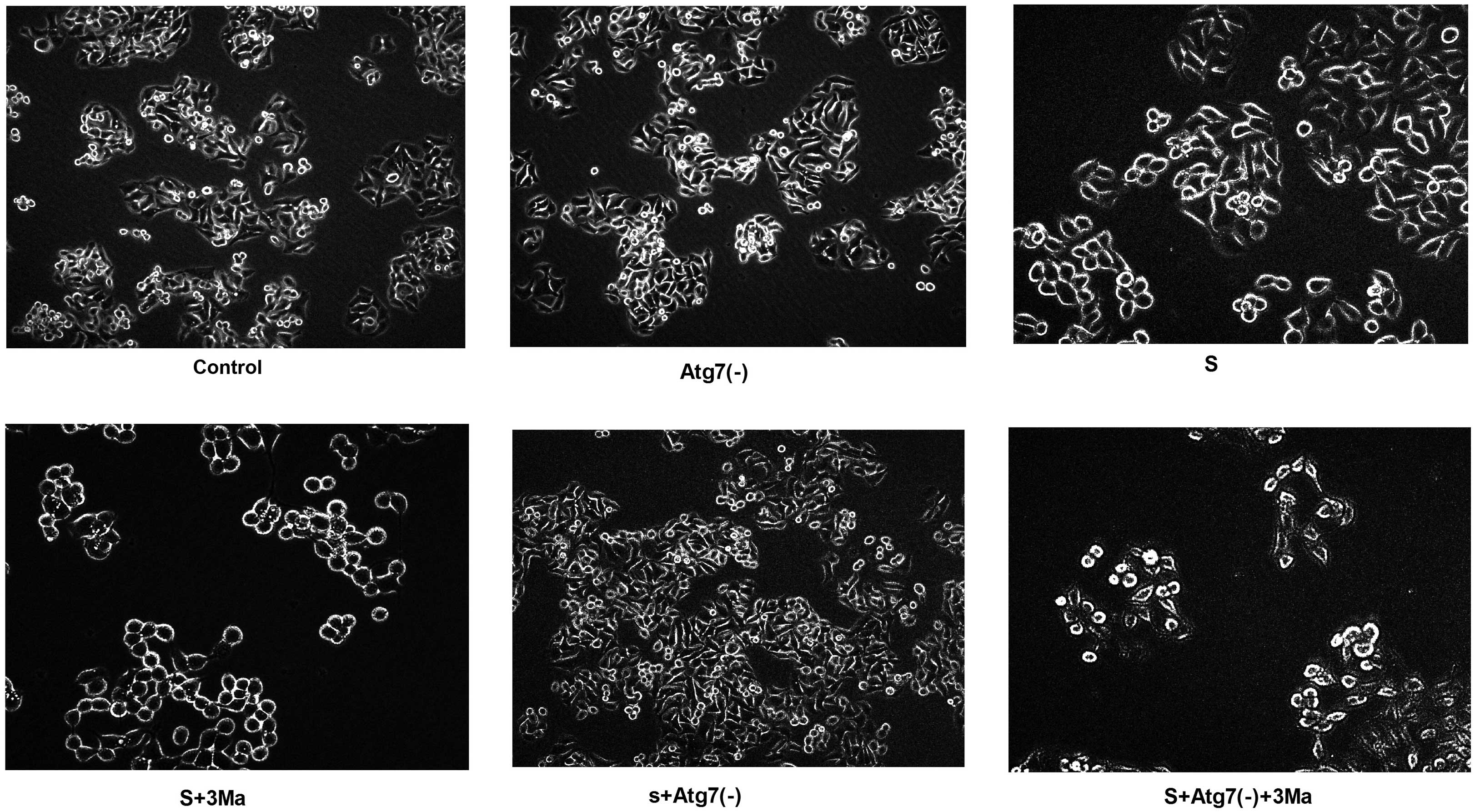|
1
|
Ahn JH and Lee M: Autophagy-dependent
survival of mutant B-raf melanoma cells selected for resistance to
apoptosis induced by inhibitors against oncogenic B-raf. Biomol
Ther (Seoul). 21:114–120. 2013. View Article : Google Scholar : PubMed/NCBI
|
|
2
|
Guo JY, Karsli-Uzunbas G, Mathew R, Aisner
SC, Kamphorst JJ, Strohecker AM, Chen G, Price S, Lu W, Teng X, et
al: Autophagy suppresses progression of K-ras-induced lung tumors
to oncocytomas and maintains lipid homeostasis. Genes Dev.
27:1447–1461. 2013. View Article : Google Scholar : PubMed/NCBI
|
|
3
|
Zhu L, Du H, Shi M, Chen Z and Hang J:
ATG7 deficiency promote apoptotic death induced by Cisplatin in
human esophageal squamous cell carcinoma cells. Bull Cancer.
100:15–21. 2013.PubMed/NCBI
|
|
4
|
Shen J, Zheng H, Ruan J, Fang W, Li A,
Tian G, Niu X, Luo S and Zhao P: Autophagy inhibition induces
enhanced proapoptotic effects of ZD6474 in glioblastoma. Br J
Cancer. 109:164–171. 2013. View Article : Google Scholar : PubMed/NCBI
|
|
5
|
Tong Y, You L, Liu H, Li L, Meng H, Qian Q
and Qian W: Potent antitumor activity of oncolytic adenovirus
expressing Beclin-1 via induction of autophagic cell death in
leukemia. Oncotarget. 4:860–874. 2013.PubMed/NCBI
|
|
6
|
Basit F, Cristofanon S and Fulda S:
Obatoclax (GX15-070) triggers necroptosis by promoting the assembly
of the necrosome on autophagosomal membranes. Cell Death Differ.
20:1161–1173. 2013. View Article : Google Scholar : PubMed/NCBI
|
|
7
|
Yue W, Hamaï A, Tonelli G, Bauvy C,
Nicolas V, Tharinger H, Codogno P and Mehrpour M: Inhibition of the
autophagic flux by salinomycin in breast cancer
stem-like/progenitor cells interferes with their maintenance.
Autophagy. 9:714–729. 2013. View Article : Google Scholar : PubMed/NCBI
|
|
8
|
Kumar S, Kumar A, Pathania AS, Guru SK,
Jada S, Sharma PR, Bhushan S, Saxena AK, Kumar HM and Malik F:
Tiron and trolox potentiate the autophagic cell death induced by
magnolol analog Ery5 by activation of Bax in HL-60 cells.
Apoptosis. 18:605–617. 2013. View Article : Google Scholar : PubMed/NCBI
|
|
9
|
Park JH, Lee JE, Lee SJ, Park SJ, Park KH,
Jeong M and Koh HC: Potential autophagy enhancers protect against
fipronil-induced apoptosis in SH-SY5Y cells. Toxicol Lett.
223:25–34. 2013. View Article : Google Scholar
|
|
10
|
Qu W, Xiao J, Zhang H, Chen Q, Wang Z, Shi
H, Gong L, Chen J, Liu Y, Cao R and Lv J: B19, a novel monocarbonyl
analogue of curcumin, induces human ovarian cancer cell apoptosis
via activation of endoplasmic reticulum stress and the autophagy
signaling pathway. Int J Biol Sci. 9:766–777. 2013. View Article : Google Scholar : PubMed/NCBI
|
|
11
|
Polewska J, Skwarska A, Augustin E and
Konopa J: DNA-damaging imidazoacridinone C-1311 induces autophagy
followed by irreversible growth arrest and senescence in human lung
cancer cells. J Pharmacol Exp Ther. 346:393–405. 2013. View Article : Google Scholar : PubMed/NCBI
|
|
12
|
Wei YM, Li X, Xu M, Abais JM, Chen Y,
Riebling CR, Boini KM, Li PL and Zhang Y: Enhancement of autophagy
by simvastatin through inhibition of Rac1-mTOR signaling pathway in
coronary arterial myocytes. Cell Physiol Biochem. 31:925–937. 2013.
View Article : Google Scholar : PubMed/NCBI
|
|
13
|
Ye L, Zhao X, Lu J, Qian G, Zheng JC and
Ge S: Knockdown of TIGAR by RNA interference induces apoptosis and
autophagy in HepG2 hepatocellular carcinoma cells. Biochem Biophys
Res Commun. 437:300–306. 2013. View Article : Google Scholar : PubMed/NCBI
|
|
14
|
Sheng Y, Sun B, Guo WT, Zhang YH, Liu X,
Xing Y and Dong DL: 3-Methyladenine induces cell death and its
interaction with chemotherapeutic drugs is independent of
autophagy. Biochem Biophys Res Commun. 432:5–9. 2013. View Article : Google Scholar : PubMed/NCBI
|
|
15
|
Lei FR, Li XQ, Liu H, Zhu RD, Meng QY and
Rong JJ: Rapamycin and 3-methyladenine regulate apoptosis and
autophagy in bone-derived endothelial progenitor cells. Chin Med J
(Engl). 125:4076–4082. 2012.PubMed/NCBI
|
|
16
|
Lin YC, Kuo HC, Wang JS and Lin WW:
Regulation of inflammatory response by 3-methyladenine involves the
coordinative actions on Akt and glycogen synthase kinase 3β rather
than autophagy. J Immunol. 189:4154–4164. 2012.PubMed/NCBI
|
|
17
|
Chang TK, Shravage BV, Hayes SD, Powers
CM, Simin RT, Wade Harper J and Baehrecke EH: Uba1 functions in
Atg7- and Atg3-independent autophagy. Nat Cell Biol. 15:1067–1078.
2013. View
Article : Google Scholar : PubMed/NCBI
|
|
18
|
Qin Z, Xue J, He Y, Ma H, Jin G, Chen J,
Hu Z, Liu X and Shen H: Potentially functional polymorphisms in
ATG10 are associated with risk of breast cancer in a Chinese
population. Gene. 527:491–495. 2013. View Article : Google Scholar : PubMed/NCBI
|
|
19
|
Balmer D, Emery M, Andreux P, Auwerx J,
Ginet V, Puyal J, Schorderet DF and Roduit R: Autophagy defect is
associated with low glucose-induced apoptosis in 661W photoreceptor
cells. PLoS One. 8:e741622013. View Article : Google Scholar : PubMed/NCBI
|
|
20
|
Ramírez-Peinado S, León-Annicchiarico CL,
Galindo-Moreno J, Iurlaro R, Caro-Maldonado A, Prehn JH, Ryan KM
and Muñoz-Pinedo C: Glucose-starved cells do not engage in
prosurvival autophagy. J Biol Chem. 288:30387–30398.
2013.PubMed/NCBI
|
|
21
|
Pliyev BK and Menshikov M: Differential
effects of the autophagy inhibitors 3-methyladenine and chloroquine
on spontaneous and TNF-α-induced neutrophil apoptosis. Apoptosis.
17:1050–1065. 2012.PubMed/NCBI
|
|
22
|
Tseng HC, Liu WS, Tyan YS, Chiang HC, Kuo
WH and Chou FP: Sensitizing effect of 3-methyladenine on
radiation-induced cytotoxicity in radio-resistant HepG2 cells in
vitro and in tumor xenografts. Chem Biol Interact. 192:201–208.
2011. View Article : Google Scholar : PubMed/NCBI
|
|
23
|
Wu YT, Tan HL, Shui G, Bauvy C, Huang Q,
Wenk MR, Ong CN, Codogno P and Shen HM: Dual role of
3-methyladenine in modulation of autophagy via different temporal
patterns of inhibition on class I and III phosphoinositide
3-kinase. J Biol Chem. 285:10850–10861. 2010. View Article : Google Scholar : PubMed/NCBI
|


















